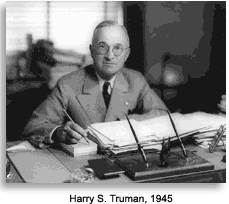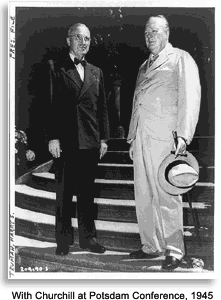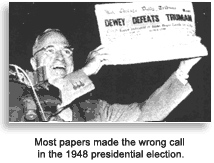Harry S. Truman, America's 33rd president, was born on May 8, 1884, in Lamar, Missouri. Serving as vice president for only 82 days, he succeeded Franklin D. Roosevelt, upon his death on April 12, 1945. FDR's condition was a closely held secret, and he had not prepared Truman for ascension to the presidency. America was still embroiled in World War II. President Truman was thrust onto the world political stage at a critical time in modern history. Courage, determination and imagination were required and well met during the Missouri Democrat's presidency.
 Shortly after the Allies achieved victory in Europe, Truman was faced with one of the most awesome decisions faced by anyone in world history; he decided to drop the first atomic bombs on Imperial Japan. The two bombs ultimately killed more than 200,000 people and ended World War II. Truman struggled through the Korean War, apparently unable to bring it to a close, and faced a frustrated and angry Congress that was beginning to threaten impeachment proceedings against him. He declined to run for president again in 1952 and returned home. Truman died in Kansas City, Missouri, on Dec 26, 1972.
Shortly after the Allies achieved victory in Europe, Truman was faced with one of the most awesome decisions faced by anyone in world history; he decided to drop the first atomic bombs on Imperial Japan. The two bombs ultimately killed more than 200,000 people and ended World War II. Truman struggled through the Korean War, apparently unable to bring it to a close, and faced a frustrated and angry Congress that was beginning to threaten impeachment proceedings against him. He declined to run for president again in 1952 and returned home. Truman died in Kansas City, Missouri, on Dec 26, 1972.
Truman's youth
The Truman birthplace, which the family occupied until Harry was 11 months old, was built between 1880 and 1882. John Anderson Truman and Martha Ellen Young Truman purchased the 20- by 28-foot house as newlyweds in 1882 for $685. Visitors today can view its four downstairs rooms and two upstairs rooms, as well as the smokehouse, well and outhouse located in the back. The modest furnishings inside the house and the surrounding landscaping represent a typical home of the time. It has neither electricity nor indoor plumbing.
Harry S. Truman was the eldest of three children; he had a brother and a sister. Harry's parents could not decide on his middle name, but since both final alternatives began with "S," the Trumans adopted the middle initial by itself. When Harry was six years old, his family moved from a farm near Grandview, Missouri, to Independence, where Harry entered public school and attended the Baptist church. Young Harry started wearing eyeglasses at age eight. Cautioned by the optometrist against breaking them, Harry shied away from rough play. By 14 years of age, Harry had read all the books in the Independence Public Library, plus the Bible three times.
After graduating from high school at Independence, he worked on a variety of jobs before managing his family's farm from 1906 to 1917. Truman wanted to attend West Point, but was not accepted because of poor eyesight. He did join the Missouri National Guard in 1905. At the outset of World War I, he served in the U.S. Army as an artillery battery commander in France. Following World War I, Truman returned to Kansas City where he married his childhood sweetheart, Elizabeth Virginia ("Bess") Wallace, on June 28, 1919. He opened a men's clothing store, which failed in the postwar depression. Harry and Bess had one daughter, Mary Margaret*, born in 1924.
Truman in politics
In 1922 Truman entered local Democratic politics and was elected judge (commissioner) of Jackson County, Missouri. With the support of the influential political leader, Thomas J. Pendergast, he was elected to the U.S. Senate in 1934, where he voted consistently for New Deal legislation. Truman was re-elected to the senate in 1940 and again in 1944. During World War II, he came to national prominence as chairman of a senate investigating committee that exposed waste in the war effort. Coincidently, Truman's committee was never aware of the Manhattan Project, which alone cost $20 billion.
From vice president to president
Before the election of 1944, Truman replaced Henry A. Wallace on the Democratic ticket with FDR, and the pair went on to victory. Upon FDR's sudden death, Truman became America's 33rd president on April 12, 1945. Truman was a veteran politician and legislator, but he had no experience with foreign policy, so he had to rely on advisors and his own instincts. Indeed, the ailing Roosevelt had not prepared Truman to take over a foreign policy that called for using the atomic bomb to bring the war with Japan to a close, and for continuing relations with the Soviet Union, a U.S. wartime ally.
 Foreign policy
Foreign policy
During World War II, Truman had to contend with many powerful and sometimes devious men who were well prepared for their respective roles on the world stage. Such national leaders as Joseph Stalin, Winston Churchill and Benito Mussolini; military men, Dwight D. Eisenhower, George S. Patton Jr. and Douglas MacArthur; and scientists, Albert Einstein, J. Robert Oppenheimer and Edward Teller, had decades of training and experience on the world stage and were leaders in their respective fields.
Enmity had grown between Truman and generals Patton and MacArthur. Both men were respected and admired American heroes. Patton and MacArthur each had their own concept of how to win World War II in their respective theaters. The situations were unique for each general, but the bone of contention between Truman and those two men was simply, who was in charge of foreign policy.
The Manhattan Project had begun in 1942, during the Third Franklin Roosevelt Administration. Truman did not learn about the project until after FDR's death. Truman knew the planned invasion of the Japanese homeland, "Olympic," would exact a terrible cost of life. At the time, little was known of the side effects from the blast of an atomic weapon. Irradiation from the atom bombs eventually killed about as many people as the actual explosions. Current estimates put the total loss of Japanese life at Hiroshima and Nagasaki at about 200,000 souls. On August 14, 1945, Japan surrendered unconditionally.
Postwar presidency
Truman became convinced that Stalin meant to extend Communist influence throughout Europe. By early 1947, the president had a new foreign policy in the making. In its later stages it was called "Containment" and was aimed at blocking Communist expansion anywhere in the world. Under Truman, the Marshall Plan and the North Atlantic Treaty Organization (NATO) were the major manifestations of containment and committed the United States to a role of world leadership it had never before been willing to assume. The war years had brought America out of its Isolationism.
Implemented in 1947 and 1948, the Marshall Plan was a massive American-financed reconstruction program for war-torn Europe. At the time, NATO was a military alliance established in 1949 to provide a common defense against potential Soviet and later Communist Chinese military aggression, and it was the first peacetime military alliance the U.S. had ever joined.
Truman's Executive Order 9981 on July 26, 1948, desegregated the military. The order declared: "There shall be equality of treatment and opportunity for all persons in the armed services without regard to race, color, religion or national origin." Truman also established a presidential committee to oversee the desegregation of military units. By the end of the Korean War in 1953, 90 percent of the units were integrated.
Truman presided over major domestic events and trends in the late forties and early fifties:
 Despite much postwar dissatisfaction with the Democratic record, Truman pulled off an upset victory over Thomas E. Dewey in 1948. In 1950, he led the United States into the Korean War.
Despite much postwar dissatisfaction with the Democratic record, Truman pulled off an upset victory over Thomas E. Dewey in 1948. In 1950, he led the United States into the Korean War.
Fighting Communism and the Korean War
The Korean War broke out in June 1950, when North Korean forces swept into South Korea, and lasted for three and a half years. U.S. commanding general MacArthur had originally estimated a short campaign, but had not anticipated the entry of the Chinese into the conflict on behalf of North Korea. Inexperienced American soldiers were fighting alongside South Korean troops. By late summer, battle-hardened veterans of World War II were recalled into service and began to bolster the American forces, just as more modern weaponry and equipment started to arrive from the United States.
President Truman had reprimanded MacArthur on several occasions for publicly disagreeing with him over the general's proposal to pursue the Chinese across the Yalu River into China during the Korean War. The president relieved him of his command in April 1951. In secret, they had even discussed the possibility of using nuclear bombs against the North Koreans and the Chinese.
Extending beyond Truman's term of office, the war ended in stalemate at the 38th parallel, which was the same point at which it had started.